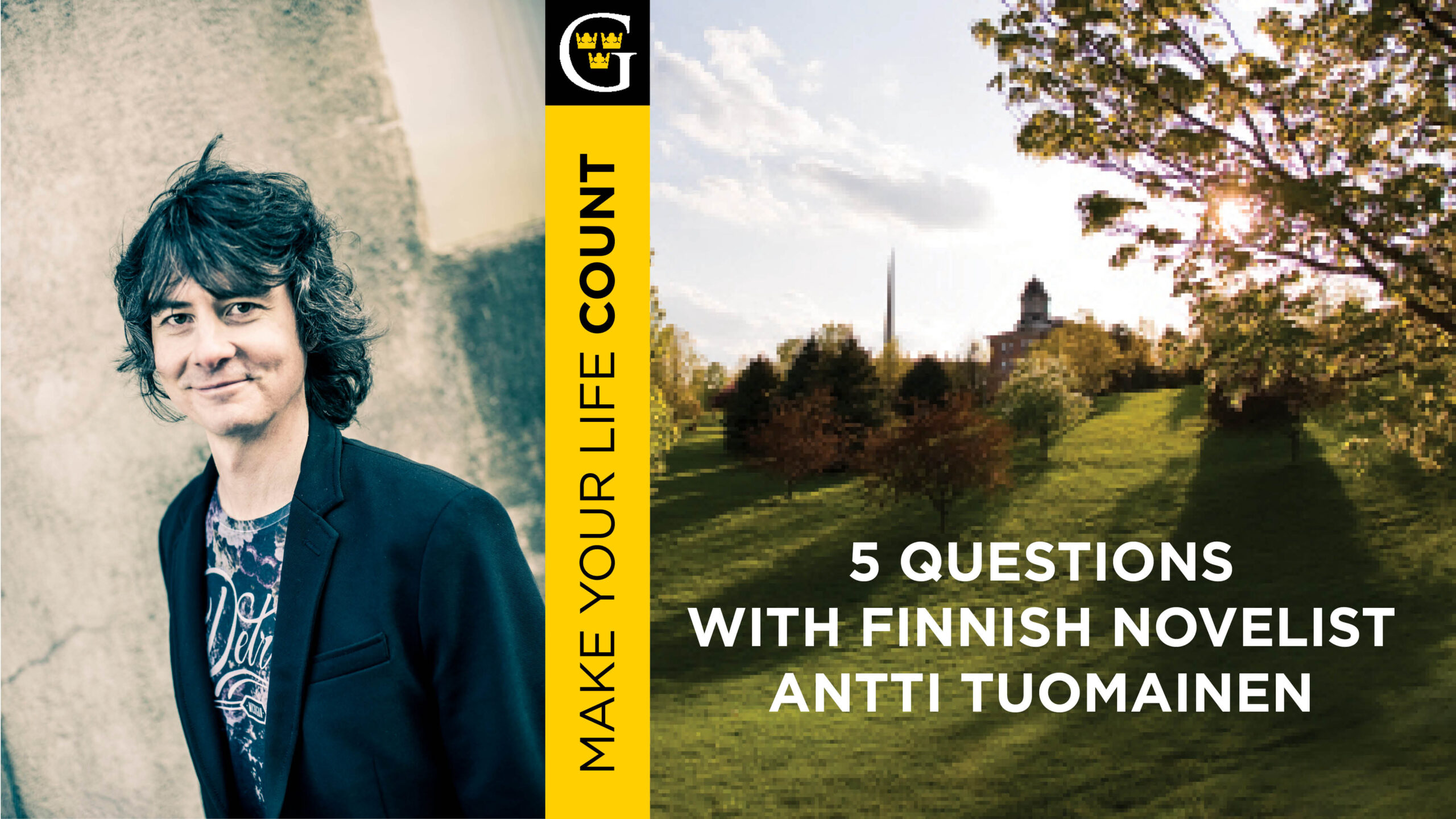He’s been dubbed both “the king of Helsinki noir” and “the funniest writer in Europe.” Think: Coen Brothers but even further north than Fargo. A movie adaptation of his novel The Rabbit Factor, about an actuary who inherits an adventure park, will star Steve Carell. Two of his other books have already been adapted for screen, The Man Who Died (a series now streaming on Acorn), and the movie Little Siberia, which just wrapped filming and is coming to Netflix in 2025.
During Tuomainen’s visit April 21–27, he will visit classes, meet with students, and hold a public lecture, “Finland is Fun,” at 7 p.m. on Wednesday, April 24, in Wallenburg Auditorium, Nobel Hall of Science. He will also hold Saint Peter and Minneapolis events.
Here are Gustavus’s five questions with him.
GUSTAVUS 1: You seem to have had quite a liberal arts career, majoring in English and philosophy. (Oh, the humanities!). How did your major(s) inform them, as well as your work as a fiction writer?
AT: To make a really long story overtly short: the two years I spent at the university—before setting out to gather some life experience, to put it in polite terms—were of crucial importance. I truly enjoyed English and especially the literature part of the studies, and I think it has benefited me in numerous ways ranging from the knowledge of history to learning how language can be used. This is true both for my long-ago career as a copywriter and it is true for my work today as a full-time novelist.
G 2: You have written a variety of different types of stories. What topics, themes, and approaches do you like to explore in your work? Having now been published in more than 30 countries, what is the universal appeal to your work, do you think?
I like to write, in one form or another, about the big things in life: love, family, faith, finding happiness, friendship, death, and, lately, sauna.
AT: When I start thinking about a book, I always start with the main character and her/his problem. There also needs to be a theme or a question in my head that I want to think about for at least a year. (Writing a book is always slower and a lot more work than one thinks.) I like to write, in one form or another, about the big things in life: love, family, faith, finding happiness, friendship, death, and, lately, sauna. I suppose that is where it becomes universal. Apart from the sauna, perhaps. (And more about that in my talk, rest assured.)
G 3: Finland is often cited as one of the “happiest” countries on Earth. And yet, your most popular books are dark comedies. Why do you think this is, and what makes Finland such a ripe environment for the darkly comic stories you tell? (Note: Our college was founded by Swedish Lutheran immigrants, and the state of Minnesota is a wintry one filled with generations of Nordic immigrants, including Finns. In a way, I’m talking about our own Minnesotan propensity for dark comedy.)
AT: I’m beginning to think that perhaps the dark humor is some kind of a survival mechanism. When the winter lasts six months you really need to come up with something witty to say. Also, I should probably mention that the first time Finland was cited as the happiest country on Earth, the Finnish people were very upset. We are not happy, everybody seemed to be saying.
G 4: What are your favorite parts of visiting colleges like Gustavus? What do you love about talking to college students, especially at liberal arts colleges, and especially about the humanities?
AT: I’m always hoping to be of some help. I don’t mean that in a grandiose way. I would like to offer encouragement and I would like to make it as clear as possible that it is not only important—not to mention a lot of fun!—to read books and look at pictures and think about abstract stuff just for a college course, but that it can also, in myriad and sometimes mysterious ways, lead to great jobs, an interesting career, and all kinds of opportunities.
G 5: What advice would you give any of Gustavus students who might want to try their hand at fiction?
AT: Sit down and start. Just start anywhere and go from there. Don’t worry if the beginning is no good. It never is, and you will have to rewrite it a hundred times, anyway. As a more general advice based on my own experience, I would say that you really need to read a lot and write a lot before you will write anything that might interest anyone besides yourself. (I still blush when I remember some rather embarrassing moments.) Also, I decided to be a writer when I was 18 and published my first book when I was 34—writing something all through that time—and I became a full-time writer when I was 40, so it took me a very long time. Based on my experience, you need to work very hard for a very long time and you need massive patience and resilience. But it is all worth it.

Leave a Reply
You must be logged in to post a comment.